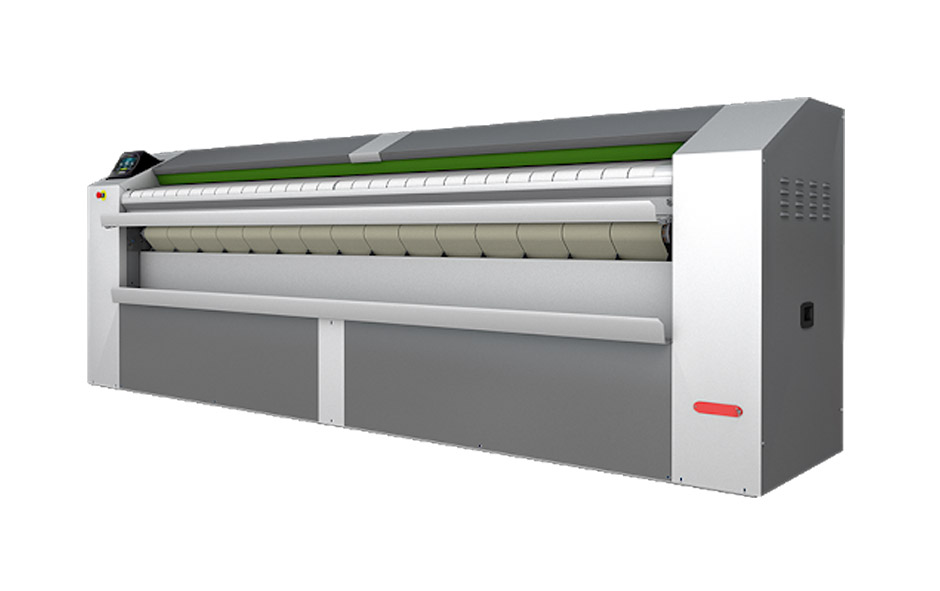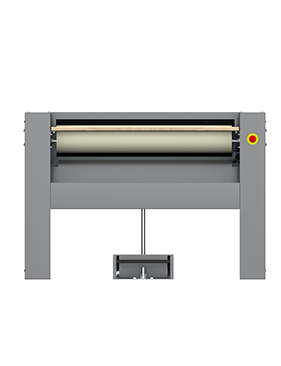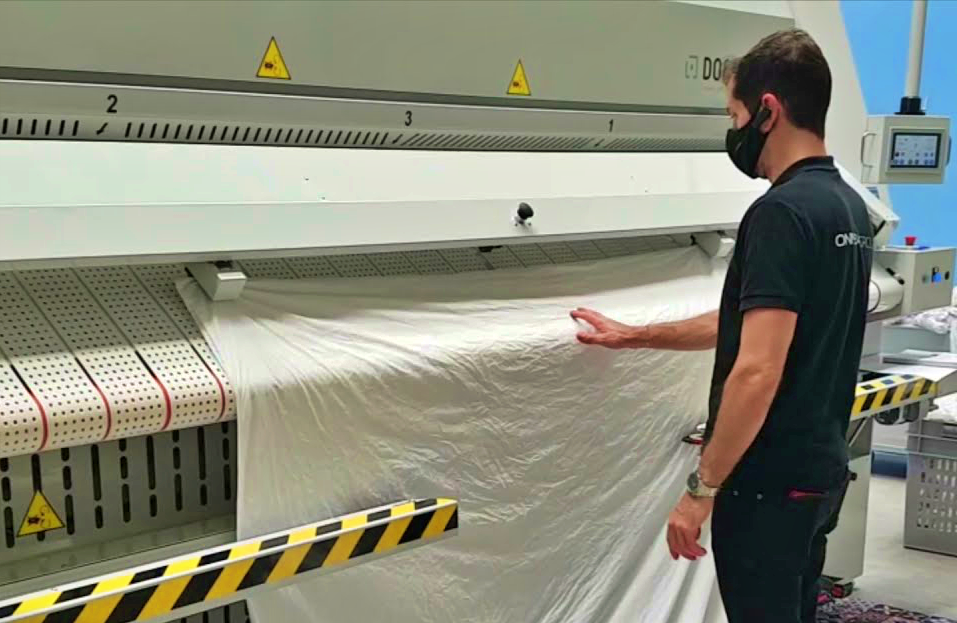Wall ironer or flatwork ironer?
Learn the difference between wall ironer and flatwork ironer, so you can choose the machine best suited to your business needs. If you are setting up or redesigning your industrial laundry, you probably have some doubts and are unsure about exactly which equipment to choose.
In this post we want to help answer your questions and, in particular, we will focus on explaining the differences between wall ironers and flatwork ironers, as well as their different types.
Industrial laundries are the most practical solution for businesses that handle large volumes of linen. In these kinds of spaces, it is important to have machines that can not only work and process significant quantities of laundry, but that can also withstand constant and intense washing rates.

At DOMUS, we specialise in the development, improvement and marketing of this type of machinery for industrial laundries. We create products using robust materials that stand the test of time, so that you can see a return on your investment.
But above all, we design customisable machines that adapt to multiple spaces and work dynamics to fit into your laundry. In our catalogue you will find machines designed for industrial ironing, and perhaps you are not sure which would be the best investment for your business. Worry no more because you are about to find out.
Wall ironers
The main difference between wall ironers and flatwork ironers is that a wall ironer handles linen with less residual moisture, as it is only an ironer and not a dryer-ironer like a flatwork ironer. For this reason, it is recommended to iron table covers or other flat linen after drying, with a residual humidity of around 20%.
Both are professional ironing machines that guarantee a perfect wash finish and maximum care for the garments. With the application of heat and the use of rollers, they can iron large quantities of linen and large garments extremely efficiently.

Wall ironers are smaller than flatwork ironers and they are simple and intuitive to use. The garments are fed in through the front of the machine, passing over the roller while heat is applied, and they are then returned, now ironed, also through the front.
Due to their smaller size and the fact they have fewer features than flatwork ironers, they are the ideal choice for businesses that do not handle large volumes and that require modest investments.
They are the ideal solution for hostels, restaurants or small hotels that need to iron sheets, towels and tablecloths on a daily basis.
DOMUS wall ironers are made from stainless steel and are equipped with electronic microprocessors for switching on and off, as well as for controlling the temperature from 50 to 180°C.
Flatwork ironers for industrial laundries
Flatwork ironers are drying and ironing machines designed to improve the performance and productivity of your industrial laundry. They can withstand intense work rates and take the utmost care of the garments. In addition, they are equipped with processors that allow the ironing process to be adapted to the needs of each service in order to save energy and time.
When designing a laundry, it is important to scale the flatwork ironer to accommodate possible growth. It is easy enough to add washers or dryers to a laundry with increasing output, but you need to plan for the right ironer in order to absorb that growth.
Domus flatwork ironers are the only ones on the market with the variable feed speed option: OPTIMAL FEEDING. This is fundamental for getting the most out of the flatwork ironer, as the speed is reduced to allow for manual feeding and sped up for the ironing process.
An operator using a flatwork ironer without feeding assistance is unable to feed the machine at the high ironing speed, meaning they cannot take full advantage of the ironing speed and output capacity, and must reduce the speed to feed in the garments. It is very important to be aware of this advantage, as it directly impacts the productivity and efficiency of the entire laundry.
In general, flatwork ironers are usually larger than wall ironers and they involve larger investments. However, their high energy efficiency makes them the perfect choice for busy laundries, as they allow for savings on energy costs in the medium and long term, helping to deliver a return on investment.
Domus wall-mounted flatwork ironers
At DOMUS, we have several models of flatwork ironers to suit every business. Below, we introduce you to the two most important categories of these machines:
-
Wall-mounted flatwork ironers: The machines are made up of a system of rollers and heating that allow for simultaneous drying and ironing, optimising the final stage in the garment washing process. They are equipped with state-of-the-art systems such as Efficient Iron, which provides moisture control and improves the energy efficiency of the machine.
They also incorporate the same TOUCH II microprocessors as washers and dryers, which makes them easier to use, for quick and easy ironing programming via a touch screen, in addition to a long list of energy-efficiency features. It is also worth noting that some of our models offer advanced features like radiant gas burners, rear exits and automatic folders.
- Compact flatwork ironers: These flatwork ironers are an ideal option for small yet busy laundries, as they allow increased productivity while maintaining small dimensions. They integrate various features in a single machine, saving time and energy on every use. A single machine can dry, iron, fold and stack the laundry in a single operation and require no more than 27 m² of space. Some models can have an automatic clamp feeder, making ironing so easy that they can be operated by a single user. They can be used with all electric, gas and steam heating systems.
Whatever your final decision, don’t hesitate to ask one of our experts about the difference between wall ironer and flatwork ironer. All consultations are cost and obligation free because at DOMUS we want to help you continue to grow.
Fill in the form and we will get in touch with you as soon as possible. It’s that simple!
